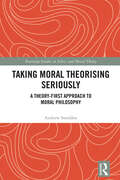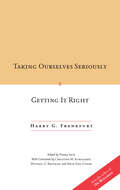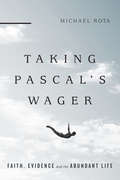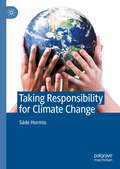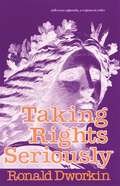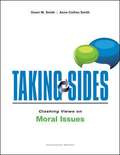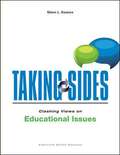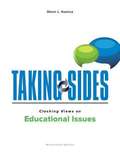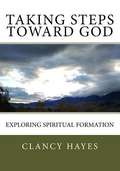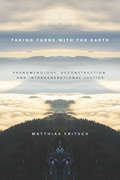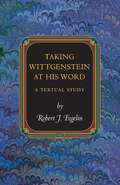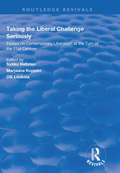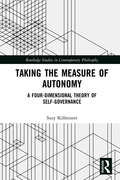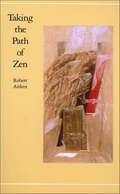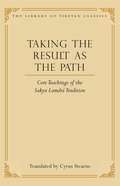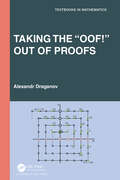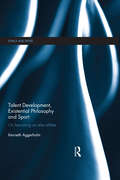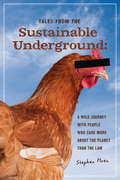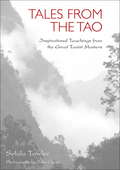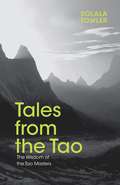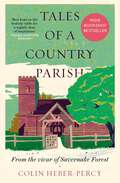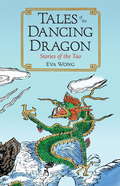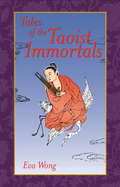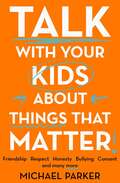- Table View
- List View
Taking Moral Theorising Seriously: A Theory-First Approach to Moral Philosophy (Routledge Studies in Ethics and Moral Theory)
by Andrew SneddonThis book develops a plausible and novel account of methodology for moral philosophy. It focuses on the structural features of moral theories, specifically what is taken as input and the process of theorising itself.Philosophers have long neglected the difficulties of identifying and using good input for moral theorising. The first part of the book argues that we should use “contrastively successful” judgements as input. A moral judgement about a case must be shown to be interpersonally superior to alternatives to qualify as input for moral theorising. The next part of the book follows recent work on theoretical virtues in science to develop an account of virtues of moral theories. It argues that moral theorists should seek defeasibly parallel maximisation of the virtues of moral theories. It then applies this overall account of a method for moral philosophy to the topic of agent-relativity and agent-neutrality.Taking Moral Theorising Seriously will appeal to researchers and graduate students interested in moral philosophy and philosophical methodology.
Taking Ourselves Seriously and Getting It Right [DECKLE EDGE]
by Harry G. FrankfurtHarry G. Frankfurt begins his inquiry by asking, "What is it about human beings that makes it possible for us to take ourselves seriously?" Based on The Tanner Lectures in Moral Philosophy, Taking Ourselves Seriously and Getting It Right delves into this provocative and original question. The author maintains that taking ourselves seriously presupposes an inward-directed, reflexive oversight that enables us to focus our attention directly upon ourselves, and "[it] means that we are not prepared to accept ourselves just as we come. We want our thoughts, our feelings, our choices, and our behavior to make sense. We are not satisfied to think that our ideas are formed haphazardly, or that our actions are driven by transient and opaque impulses or by mindless decisions. We need to direct ourselves—or at any rate to believe that we are directing ourselves—in thoughtful conformity to stable and appropriate norms. We want to get things right." The essays delineate two features that have a critical role to play in this: our rationality, and our ability to love. Frankfurt incisively explores the roles of reason and of love in our active lives, and considers the relation between these two motivating forces of our actions. The argument is that the authority of practical reason is less fundamental than the authority of love. Love, as the author defines it, is a volitional matter, that is, it consists in what we are actually committed to caring about. Frankfurt adds that "The object of love can be almost anything—a life, a quality of experience, a person, a group, a moral ideal, a nonmoral ideal, a tradition, whatever." However, these objects and ideals are difficult to comprehend and often in conflict with each other. Moral principles play an important supporting role in this process as they help us develop and elucidate a vision that inspires our love. The first section of the book consists of the two lectures, which are entitled "Taking Ourselves Seriously" and "Getting It Right." The second section consists of comments in response by Christine M. Korsgaard, Michael E. Bratman, and Meir Dan-Cohen. The book includes a preface by Debra Satz.
Taking Pascal's Wager: Faith, Evidence and the Abundant Life
by Michael RotaSince we can't know with absolute certainty that God exists, each of us in a sense makes a bet. If we believe in God and are right, the benefits include eternal life. If we are wrong, the downside is limited. On the other hand, we might not believe in God. If we are right, then we will have lived in line with reality. If we are wrong, however, the consequences could be eternally disastrous. This was the challenge posed by the French philosopher Blaise Pascal over three hundred years ago. But Michael Rota contends that Pascal's argument is still compelling today. Since there is much to gain (for ourselves as well as for others) and relatively little to lose, the wise decision is to seek a relationship with God and live a Christian life. Rota considers Pascal's wager and the roles of uncertainty, evidence and faith in making a commitment to God. By engaging with themes such as decision theory, the fine-tuning of the universe, divine hiddenness, the problem of evil, the historicity of the resurrection and the nature of miracles, he probes the many dynamics at work in embracing the Christian faith. In addition, Rota takes a turn not found in many books of philosophy. He looks at the actual effects of such a commitment in three recent, vivid, gripping examples—Dietrich Bonhoeffer, Jean Vanier and Immaculée Ilibagiza. Like Pascal, Rota leaves us with a question: What wager will we make?
Taking Responsibility for Climate Change
by Säde HormioThis book proposes that it is not only states and international bodies that have a responsibility to take action toward mitigating climate change. Other collective agents, such as corporations, need to also come onboard. Additionally, the book argues that climate change is not solely a problem for collective agents, but also for individuals, as they are members of collectives and groups of several kinds. Therefore, framing climate change responsibility exclusively from either the collective or the individual perspective leaves out something crucial: how we all are influenced by the collectives we belong to and how, in turn, collectives are influenced by individuals. The focus of the book is on areas of climate change responsibility that are often left out of the picture or get too little attention in climate ethics, such as carbon inequality within countries. But why should any theoretical arguments about normative issues matter when we have a real-life climate crisis on our hands? Säde Hormio argues that ethical arguments have an important role in setting climate policy: they can highlight what values are at stake and help ground normative arguments in public deliberations.
Taking Rights Seriously
by Ronald DworkinWhat is law? What is it for? How should judges decide novel cases when the statutes and earlier decisions provide no clear answer? Do judges make up new law in such cases, or is there some higher law in which they discover the correct answer? Must everyone always obey the law? If not, when is a citizen morally free to disobey?A renowned philosopher enters the debate surrounding these questions. Clearly and forcefully, Ronald Dworkin argues against the "ruling" theory in Anglo-American law-legal positivism and economic utilitarianism-and asserts that individuals have legal rights beyond those explicitly laid down and that they have political and moral rights against the state that are prior to the welfare of the majority. Mr. Dworkin criticizes in detail the legal positivists' theory of legal rights, particularly H. L. A. Hart's well-known version of it. He then develops a new theory of adjudication, and applies it to the central and politically important issue of cases in which the Supreme Court interprets and applies the Constitution. Through an analysis of John Rawls's theory of justice, he argues that fundamental among political rights is the right of each individual to the equal respect and concern of those who govern him. He offers a theory of compliance with the law designed not simply to answer theoretical questions about civil disobedience, but to function as a guide for citizens and officials. Finally, Professor Dworkin considers the right to liberty, often thought to rival and even pre-empt the fundamental right to equality. He argues that distinct individual liberties do exist, but that they derive, not from some abstract right to liberty as such, but from the right to equal concern and respect itself. He thus denies that liberty and equality are conflicting ideals. Ronald Dworkin's theory of law and the moral conception of individual rights that underlies it have already made him one of the most influential philosophers working in this area. This is the first publication of these ideas in book form.
Taking Sides: Clashing Views On Moral Issues
by Owen M. Smith Anne Collins SmithThe Taking Sides Collection on McGraw-Hill Create(tm) includes current controversial issues in a debate-style format designed to stimulate student interest and develop critical thinking skills.
Taking Sides: Clashing Views an Educational Issues (Expanded Eighteenth Edition)
by Glenn KoonceThe Taking Sides Collection on McGraw-Hill Create(tm) includes current controversial issues in a debate-style format designed to stimulate student interest and develop critical thinking skills. This Collection contains a multitude of current and classic issues to enhance and customize your course. You can browse the entire Taking Sides Collection on Create, or you can search by topic, author, or keywords. Each Taking Sides issues is thoughtfully framed with Learning Outcomes, an Issue Summary, an Introduction, and an Exploring the Issue section featuring Critical Thinking and Reflection, Is There Common Ground?, and Additional Resources and Internet References. Go to McGraw-Hill Create(tm) at www. mcgrawhillcreate. com, click on the "Collections" tab, and select The Taking Sides Collection to browse the entire Collection. Select individual Taking Sides issues to enhance your course, or access and select the entire Koonce: Taking Sides: Clashing Views on Educational Issues, 18/e Expanded ExpressBook for an easy, pre-built teaching resource by clicking here. An online Instructor's Resource Guide with testing material is available for each Taking Sides volume. Using Taking Sides in the Classroom is also an excellent instructor resource. Visit the Create Central Online Learning Center at www. mhhe. com/createcentral for more details.
Taking Sides: Clashing Views on Educational Issues (19th Edition)
by Glenn L. KoonceThis book presents opposing or sharply varying viewpoints on educational issues of current concerns. Unit 1 offers consideration of three basic theoretical issues that have been discussed by scholars and practitioners in past decades and are still debated today: curriculum content and its imposition upon the young, the philosophical underpinning of the process of education, and the purpose of public education. Unit 2 features five issues that are fundamental to understanding the present circumstances that shape American education: democratic classrooms for citizenship preparation, student First Amendment rights, common curriculum considerations, policy and the Common Core standards, and the challenges of poor school performance. Unit 3 examines more specific issues currently being discussed: arming teachers, universal preschool, teacher preparation and the federal government, zero tolerance and the courts, no-zero grading, virtual schools, twenty-first century skills movement, flipped learning, class size and student achievement, school funding and student achievement, charter school expansion, and the impact of technology on teaching and learning.
Taking Steps Toward God: Exploring Spiritual Formation
by Clancy P. HayesSalvation is the first step in a person’s spiritual journey, but it is just that, the first step. A person must not stop there. It is the intent of God to see all His children grow into spiritual maturity. The process of moving from spiritual infancy to maturity occurs by taking one step after another in the direction of God. This journey toward maturity is what the author means by the term “spiritual formation.”It is important for Christians to have a guide to help them navigate the path leading to maturity. Dr. Hayes clears a path for spiritual sojourners to travel and provides assistance to those who are willing to take the journey. Not everyone is at the same place in this expedition. Some people who read this book will be at the very beginning of the journey. Some will be a little way down the path. Not everything in this book will be new to the more mature Christian, but they will make new discoveries if they pay attention to their guide.Jesus promised Christians can live in spiritual abundance. This can be achieved if the believer will put one foot in front of the other. Taking Steps Toward God will help readers to walk in the right direction.
Taking Turns with the Earth: Phenomenology, Deconstruction, and Intergenerational Justice
by Matthias FritschThe environmental crisis, one of the great challenges of our time, tends to disenfranchise those who come after us. Arguing that as temporary inhabitants of the earth, we cannot be indifferent to future generations, this book draws on the resources of phenomenology and poststructuralism to help us conceive of moral relations in connection with human temporality. Demonstrating that moral and political normativity emerge with generational time, the time of birth and death, this book proposes two related models of intergenerational and environmental justice. The first entails a form of indirect reciprocity, in which we owe future people both because of their needs and interests and because we ourselves have been the beneficiaries of peoples past; the second posits a generational taking of turns that Matthias Fritsch applies to both our institutions and our natural environment, in other words, to the earth as a whole. Offering new readings of key philosophers, and emphasizing the work of Emmanuel Levinas and Jacques Derrida in particular, Taking Turns with the Earth disrupts human-centered notions of terrestrial appropriation and sharing to give us a new continental philosophical account of future-oriented justice.
Taking Wittgenstein at His Word: A Textual Study (Princeton Monographs in Philosophy #29)
by Robert J. FogelinTaking Wittgenstein at His Word is an experiment in reading organized around a central question: What kind of interpretation of Wittgenstein's later philosophy emerges if we adhere strictly to his claims that he is not in the business of presenting and defending philosophical theses and that his only aim is to expose persistent conceptual misunderstandings that lead to deep philosophical perplexities? Robert Fogelin draws out the therapeutic aspects of Wittgenstein's later work by closely examining his account of rule-following and how he applies the idea in the philosophy of mathematics. The first of the book's two parts focuses on rule-following, Wittgenstein's "paradox of interpretation," and his naturalistic response to this paradox, all of which are persistent and crucial features of his later philosophy. Fogelin offers a corrective to the frequent misunderstanding that the paradox of interpretation is a paradox about meaning, and he emphasizes the importance of Wittgenstein's often undervalued appeals to natural responses. The second half of the book examines how Wittgenstein applies his reflections on rule-following to the status of mathematical propositions, proofs, and objects, leading to remarkable, demystifying results. Taking Wittgenstein at His Word shows that what Wittgenstein claims to be doing and what he actually does are much closer than is often recognized. In doing so, the book underscores fundamental--but frequently underappreciated--insights about Wittgenstein's later philosophy.
Taking the Liberal Challenge Seriously: Essays on Contemporary Liberalism at the Turn of the 21st Century (Routledge Revivals)
by Marjaana Kopperi Sirkku Hellsten Olli LoukolaFirst published in 1997, this collection offers a critical view of modern liberal theory and attempts to present some signposts that could show a way towards a new form of liberal individualism. The first part takes a look at the theoretical aspects of contemporary liberalism. It analyses certain classics whose ideas have once again become central to the new formulation of liberal theory. The second part brings the discussion from theory to practice and to actual policies adopted in liberal Western welfare states. Its main interest is in the economic doctrines which have formed an essential part of classical liberal thought. The third part moves yet another step further in its analysis of contemporary liberal challenges. It concentrates on the problems of the liberal requirement of freedom, neutrality and tolerance.
Taking the Measure of Autonomy: A Four-Dimensional Theory of Self-Governance (Routledge Studies in Contemporary Philosophy)
by Suzy KillmisterThis book takes a radically different approach to the concept of autonomy. Killmister defends a theory of autonomy that is four-dimensional and constituted by what she calls ‘self-definition,’ ‘self-realisation,’ ‘self-unification,’ and 'self-constitution.' While sufficiently complex to inform a full range of social applications, this four-dimensional theory is nonetheless unified through the simple idea that autonomy can be understood in terms of self-governance. The ‘self’ of self-governance occupies two distinct roles: the role of ‘personal identity’ and the role of ‘practical agency.’ In each of these roles, the self is responsible for both taking on, and then honouring, a wide range of commitments. One of the key benefits of this theory is that it provides a much richer measure not just of how autonomous an agent is, but also the shape—or degree—of her autonomy. Taking the Measure of Autonomy will be of keen interest to professional philosophers and students across social philosophy, political philosophy, ethics, and action theory who are working on autonomy.
Taking the Path of Zen
by Robert AitkenThere is a fine art to presenting complex ideas with simplicity and insight, in a manner that both guides and inspires. In Taking the Path of Zen Robert Aitken presents the practice, lifestyle, rationale, and ideology of Zen Buddhism with remarkable clarity. The foundation of Zen is the practice of zazen, or mediation, and Aitken Roshi insists that everything flows from the center. He discusses correct breathing, posture, routine, teacher-student relations, and koan study, as well as common problems and milestones encountered in the process. Throughout the book the author returns to zazen, offering further advice and more advanced techniques. The orientation extends to various religious attitudes and includes detailed discussions of the Three Treasures and the Ten Precepts of Zen Buddhism. Taking the Path of Zen will serve as orientation and guide for anyone who is drawn to the ways of Zen, from the simply curious to the serious Zen student.
Taking the Result as the Path
by Cyrus Stearns His Holiness the Sakya TrizinThe tradition known as the Path with the Result, or Lamdre, is the most important tantric system of meditation practice and theory in the Sakya school of Tibetan Buddhism. This volume contains an unprecedented compilation of eleven vital works from different periods in the history of the Path with the Result in India and Tibet, including the Vajra Lines of the great Indian adept Virupa (ca. seventh-eighth centuries), the basic text of the tradition. The collection also includes six writings by Jamyang Khyentse Wangchuk (1524-68) and an instruction manual composed by the Fifth Dalai Lama (1617-62). None of the works in this book have ever been published before in any European language, and most of these writings traditionally have been considered secret. The present translation, an important new volume of the Library of Tibetan Classics, has been made with the personal approval and encouragement of His Holiness Sakya Trizin, head of the Sakya tradition. Students of the Lamdre will rejoice at the availability and lucidity of this major translation of key Sakya texts.
Taking the “Oof!” Out of Proofs (Textbooks in Mathematics)
by Alexandr DraganovThis book introduces readers to the art of doing mathematical proofs. Proofs are the glue that holds mathematics together. They make connections between math concepts and show why things work the way they do. This book teaches the art of proofs using familiar high-school concepts, such as numbers, polynomials, functions, and trigonometry. It retells math as a story, where the next chapter follows from the previous one.Readers will see how various mathematical concepts are tied and will see that mathematics is not a pile of formulas and facts; rather, it has an orderly and beautiful edifice.The author begins with basic rules of logic and then progresses through the topics already familiar to the students: numbers, inequalities, functions, polynomials, exponents, and trigonometric functions. There are also beautiful proofs for conic sections, sequences, and Fibonacci numbers. Each chapter has exercises for the reader.Reviewer Comments:I find the book very impressive. The choice and sequence of topics is excellent, and it is wonderful to have all of these things together in one volume. Theorems are clearly stated, and proofs are accurate. – Michael ComenetzThe thoroughness of the narrative is one of the main strengths of the book. The book provides a perfect illustration of mathematical thinking. Each step of a given derivation is precise and clear. – Julie GershunskayaDraganov’s book stands out from the many competing books. Draganov’s goal is to show that mathematics depends on the notion of proof. Unlike other transition books, he addresses mathematical topics at an accessible level, rather than topics studied later in the university curriculum. – Ken Rosen
Talent Development, Existential Philosophy and Sport: On Becoming an Elite Athlete (Ethics and Sport)
by Kenneth Aggerholm'Why don’t young athletes in sport just quit?’ Starting with this question and drawing on existential philosophy, phenomenology and hermeneutics, Talent Development, Existential Philosophy and Sport seeks a deeper understanding of the experience of being a talented young sportsperson striving to become an elite athlete. As an alternative to conventional approaches to talent development governed by a worldview of instrumental rationality, the book introduces key ideas from educational philosophy to describe talent development through the concept of elite-Bildung. It pursues an existential understanding of developing in sport as a process of freedom, self-transcendence, striving for excellence and building up habits. The book highlights a range of ambiguous and intriguing existential phenomena – most prominently wonder, question, expression, humour and repetition – and reveals an existential layer of meaning within talent development in sport, which can facilitate the process of becoming an elite athlete and give young athletes a number of reasons not to quit. By deepening our understanding of performance and development in sport, and the process of becoming an elite player, this book is important reading for any serious student or researcher working in the philosophy of sport, sports coaching, sports development, sport psychology or applied sport science.
Tales From the Sustainable Underground
by Stephen HrenActivists striving for any type of social change often find themselves operating on the fringes of legal and social norms. Many experience difficulties when their innovative ideas run afoul of antiquated laws and regulations that favor a big business energy- and material-intensive approach. Tales From the Sustainable Underground is packed with the stories of just some of these pioneers-who care more for the planet than the rules-whether they're engaged in natural building, permaculture, community development, or ecologically based art. Ride along and meet courageous and inspiring individuals such as:*Solar guru Ed Eaton*Radical urban permaculturists Scott Kellogg and Stacy Pettigrew*Artist, eco-architect, and intuitive builder Matt BuaEqually entertaining and informative, the profiles in this highly original book provide a unique lens through which to view deeper questions about the societal structures that are preventing us from attaining a more sustainable world. By examining such issues as the nature of property rights and the function of art in society, the author raises profound questions about how our social attitudes and mores have contributed to our current destructive paradigm.Tales From the Sustainable Underground is a must-read for sustainability activists in any field, or for anyone who wants to learn about more radical forms of sustainability activities in an entertaining way.Stephen Hren is a restoration carpenter, builder, and teacher who specializes in sustainable design and passive and active solar heating technologies. He is co-author of The Carbon-Free Home and A Solar Buyer's Guide for the Home and Office.
Tales from the Tao
by Solala TowlerAn inspiring collection of the best stories from the Taoist masters, Chuang Tzu and Lao Tzu--all presented in a beautiful volume with over 100 black-and-white photographs. For thousands of years, students of the Tao have gleaned inspiration and illumination from its parables, and these thought-provoking examples discuss topics ranging from dignity in the face of challenge, to judging character, to how to deal with loss. Whether solidifying a spiritual truth, unraveling a puzzle for contemplation, or providing a moment of humor, these tales are a mainstay of Eastern philosophy. Brief poems and intriguing quotations round out the anthology.
Tales from the Tao: The Wisdom of the Taoist Masters
by Solala TowlerFor thousands of years, students of the Tao have gleaned inspiration and illumination from its parables, and these thought-provoking examples discuss topics ranging from dignity in the face of challenge, to judging character, to how to deal with loss. Whether solidifying a spiritual truth, unravelling a puzzle for contemplation, or providing a moment of humour, these tales are a mainstay of Eastern philosophy. This unique collection brings together the most inspiring, illuminating and downright funny stories from the classical works of Taoist masters, alongside new writing inspired by traditional tales. Set against a backdrop of the mountains, waterfalls and gorges of China, these tales introduce important Taoist ideas about many of the most basic human experiences – including birth, death, loss, pleasure, and how to surrender to the most fundamental experience of the Tao itself. Interwoven with classic Taoist quotations and illustrated with beautiful photography throughout, these engrossing narratives are as relevant today as they were in the great dynasties of ancient China.
Tales of a Country Parish: From the vicar of Savernake Forest
by Colin Heber-Percy'A delightful book from a gentle, generous spirit.' - SIMON RUSSELL BEALE'Philosophical speculation, country lore, rock music, spiritual exploration, erudite and beautifully written, this collection of reflections and meditations is a surprise and a delight. The kind of shot in the arm the Church of England badly needs - and is so rarely to be found.' - SALLEY VICKERSDuring the unprecedented circumstances of Spring 2020, Colin Heber Percy began writing a daily newsletter of reflections and uplifting stories to stay in touch with his parishioners. Word spread, and soon his bulletins were being eagerly consumed by readers around the country and beyond.In this thought-provoking and invigorating book, Heber-Percy draws upon a kaleidoscopic knowledge of nature, philosophy, poetry and music, as well as religious writings, and interlaces them with amusing and touching vignettes from his Wiltshire parish.As he follows the changing seasons, Heber-Percy moves from the seemingly small and mundane to ponder big life questions - can you find heaven in a Londis shop, why is the Bible not like the Highway Code, what on earth we are all doing here - while gently offering up wisdom and sustenance for all, regardless of faith and creed.
Tales of a Country Parish: From the vicar of Savernake Forest
by Colin Heber-Percy'A delightful book from a gentle, generous spirit.' - SIMON RUSSELL BEALE'Philosophical speculation, country lore, rock music, spiritual exploration, erudite and beautifully written, this collection of reflections and meditations is a surprise and a delight. The kind of shot in the arm the Church of England badly needs - and is so rarely to be found.' - SALLEY VICKERSDuring the unprecedented circumstances of Spring 2020, Colin Heber Percy began writing a daily newsletter of reflections and uplifting stories to stay in touch with his parishioners. Word spread, and soon his bulletins were being eagerly consumed by readers around the country and beyond.In this thought-provoking and invigorating book, Heber-Percy draws upon a kaleidoscopic knowledge of nature, philosophy, poetry and music, as well as religious writings, and interlaces them with amusing and touching vignettes from his Wiltshire parish.As he follows the changing seasons, Heber-Percy moves from the seemingly small and mundane to ponder big life questions - can you find heaven in a Londis shop, why is the Bible not like the Highway Code, what on earth we are all doing here - while gently offering up wisdom and sustenance for all, regardless of faith and creed.
Tales of the Dancing Dragon: Stories of the Tao
by Eva WongHere, Taoist practitioner Eva Wong offers a colorful treatment of the history and evolution of Taoism, told through traditional teaching tales. These tales, which Wong first heard as a child growing up in Hong Kong, are gleaned from the local storytellers and the uncensored chronicles known as yeshi--the wild history of China, not monitored by the official imperial scholars and historians. The stories are by turns mysterious and intriguing, passionate and violent, and they are peppered with colorful characters, including hermits, politicians, social activists, revolutionaries, scholars, scientists, and mystics. Arranged chronologically from prehistory through the early twentieth century, these stories introduce the schools in the Taoist lineages, and capture the defeats and victories of Taoism, its periods of decadence and decay, and its renewal, maturation, and spiritual triumph. Wong puts these stories into context, and shows that Taoism is a dynamic spiritual tradition, constantly changing--and being influenced by--history.
Tales of the Taoist Immortals
by Eva WongAs a girl growing up in Hong Kong, Eva Wong heard and memorized many tales told to her by Hong Kong's finest professional storytellers, by actors on the radio, and by her grandmother. These popular tales of the Taoist immortals were also often dramatized in Chinese operas. The stories are of famous characters in Chinese history and myth: a hero's battle with the lords of evil, the founder of the Ming dynasty's treacherous betrayal of his friends, a young girl who saves her town by imitating rooster calls. Entertaining and often provocative, these tales usually include a moral. The immortals are role models in Chinese culture, as well as examples of enlightenment. Some of the immortals were healers, some were social activists, some were aristocrats, and some were entrepreneurs. The tales chosen by Eva Wong here are of the best-known immortals among the Chinese. Their names are household words and their stories are told and retold by one generation to the next.
Talk With Your Kids About Things That Matter: A must have guide to consent, bullying, fake news and more
by Michael ParkerWhat makes a person good? Is it their impeccable table manners? Whether they participate in protests? The way they treat the waiter?Talk to Your Kids About Things That Matter is the go-to guide for navigating ethics in the 21st century. In a post-Trump, post-truth world, the lines between right and wrong are increasingly blurred and ethics matter more than ever. More of us are questioning the world that we live in and what is our role inside it. Inside this book you&’ll find over 100 conversation starters for creating meaningful, thought-provoking discussions. From Plato to veganism, cancel culture to consent, and politics to basic kindness, these topics are set to engage, inspire, and even divide. It&’s the perfect accompaniment for road trips, Sunday afternoon drinks, family dinners or even a first date. Designed to have no real answer, but rather, stir even more questions, this provocative and deeply engaging book will kick your philosophical gears into action. How to be a Good Human encourages readers to dig deeper, put yourself in others&’ shoes, and be the best human you can be.
